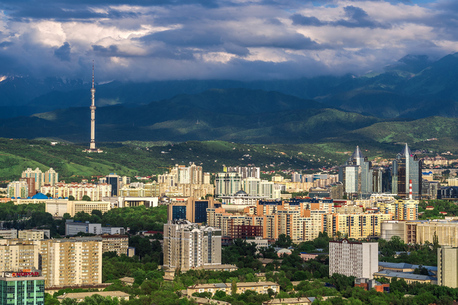“CCAMTAC”—A New IMF Regional Capacity Development Center for the Caucasus, Central Asia and Mongolia
January 10, 2020

Reflecting strong and increased engagement with countries of the Caucasus, Central Asia, and Mongolia (“CCAM”), the IMF will launch a new regional capacity development center (RCDC) in Almaty, Kazakhstan in 2020. The new center, “CCAMTAC,” will serve a diverse and dynamic region of 80 million people between Europe and Asia, Russia and the Middle East, and will help the region build strong economic institutions for their growth and development needs. The nine countries include commodity exporters (Azerbaijan, Kazakhstan, Mongolia, Turkmenistan), low-income countries (LICs) (Kyrgyz Republic, Tajikistan, Uzbekistan) and emerging market economies (EMs) (Armenia, Georgia).
The CCAM region has made progress in securing positive economic outcomes and building institutions in the three decades since the end of the Soviet Union and an early period of turbulent transition. The region grew strongly during 1998-2013, supported by high commodity prices and remittances. Poverty was reduced, fiscal balances and public debt were kept in check, and inflation was reduced. Central banks, finance and economy ministries, and statistical agencies developed policy frameworks, tools, staff, and practices with support from the IMF and other international and bilateral partners.
Still, gaps and challenges remain. These were exposed by the commodity price decline and slower growth in Russia, China, and Europe after 2014. Currency depreciation in 2015-16 put pressure on inflation and banks and public debt ratios. Government fiscal support helped but further eroded buffers, and the region remains vulnerable to external shocks. CCAM countries need to strengthen economic institutions, reduce the state’s footprint, promote private sector investment and job creation, become more inclusive, and diversify their economies.
With these challenges, CCAM countries have sought closer engagement on policy advice over the past five years. This includes hands-on technical assistance and training on growth-friendly tax measures, expenditure policy and public financial management (PFM) reforms, exchange rate flexibility and inflation-targeting approaches to monetary policy, measures to shore up local banks, further improvements to statistics and transparency, and help in designing structural reforms. The change of leadership in Uzbekistan in 2017 and reorientation of policies provided major additional impetus.
The IMF operates 16 RCDCs worldwide to coordinate a range of technical assistance, training, and peer-learning activities. These centers are close to member countries, tailored to regional challenges, and ensure sustained on-the-ground support. Some are focused on TA, others on training, and two cover both. With RCDCs in Africa, Central America, the Caribbean, the Middle East and North Africa, Southeast Asia, the Pacific Region, and more recently, China and South Asia, the CCAM region represented an important gap in coverage.
Recognizing this, the IMF began considering a center for the region focused on technical assistance to complement the training provided by JVI. CCAM country authorities were enthusiastic, and a business case was made. Initial efforts made a decade ago were not concluded, due to lack of agreement on the center’s location. Two years ago, discussions on the center were resumed.
IMF management approved CCAMTAC in early 2019. A strong spirit of regional cooperation has emerged, and earlier disagreements have faded. Several CCAM countries expressed interest in hosting the center. The Fund held an open, transparent site-selection process and requested expressions of interest from all nine countries. The host would be expected to provide substantial funding—half of expected external financing needs for the first five-year phase of operations—with assurances of continued support. Other criteria included a supportive visa regime for CCAM and non-CCAM nationals; extensive air links to CCAM capitals; satisfactory facilities, schools, health facilities, and banking services; and robust security and environmental factors (e.g., climate, pollution). Three countries—Georgia, Kazakhstan, and Uzbekistan—made excellent proposals for four cities—Almaty, Nur-Sultan, Tashkent, and Tbilisi. The selection of Almaty was announced in October 2019.
CCAMTAC will open in 2020 with a coordinator, seven advisors, and local staff. The advisors will cover macroeconomic frameworks and analysis, PFM, revenue administration, central bank operations, financial supervision, government finance statistics, and real sector statistics. The advisors will also engage short-term experts for specific assignments. Technical assistance on strategic or emerging issues—such as fintech, climate change or gender budgeting—will continue to be provided from IMF HQ, with follow-up implementation support from the center. CCAMTAC will hold workshops and other peer-to-peer events to mutually reinforce and expand training by JVI and other IMF training centers in Washington, Singapore, and China.
The center’s budget is expected to amount to $45 million for the first five years of operations. In addition to Kazakhstan’s generous support and contributions from the IMF, other CCAM countries are also expected to contribute. The remaining financing will come from development partners of the IMF and the region. The center will be governed by a Steering Committee comprising CCAM countries, development partners, and the IMF.
CCAMTAC will significantly boost IMF capacity development in the region, helping meet existing needs and responding quickly to emerging challenges. The IMF, the Kazakhstan authorities, and the other countries in the region are very excited about the closer collaboration and the additional resources to help CCAM countries strengthen their economies and provide more opportunities for their people.
Mark Horton, IMF Middle East and Central Asia Department










